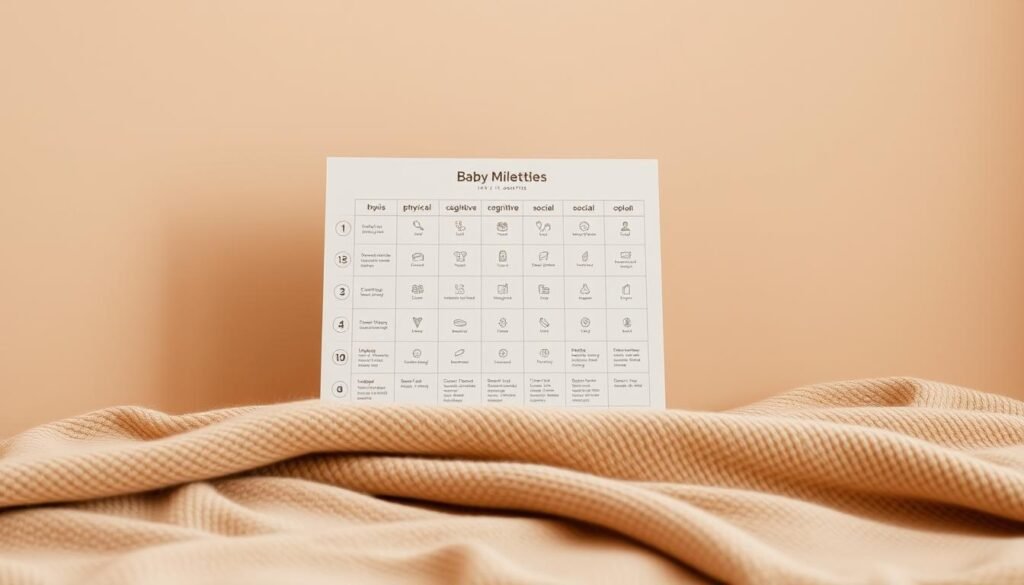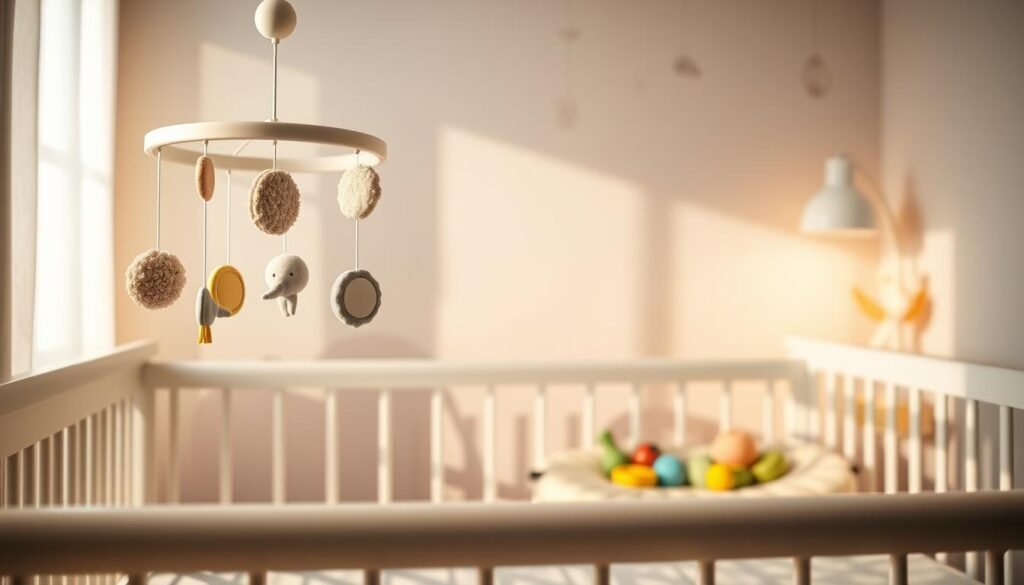Essential Baby Development Milestones for Parents

Watching your baby grow and learn new things is amazing. You might wonder if they’re doing okay and what to expect next.
Understanding key infant milestones helps you see how your child is doing. It also lets you spot any delays early.
The CDC says developmental milestones are big steps like first steps, smiling, and waving goodbye. Knowing these helps you support your child and enjoy their achievements.
Understanding Baby Development Milestones
Developmental milestones are like signposts on your baby’s journey to growing up. They mark significant achievements in their growth and development.
These milestones track progress in various areas. This includes physical growth, hearing, vision, balance and coordination, verbal and social skills, and even toileting. Johns Hopkins Medicine notes that monitoring these milestones helps parents understand their child’s overall development.
What Are Development Milestones?
Developmental milestones are behaviors or physical skills that show a child’s growth and development. They can include smiling, walking, or saying first words. These milestones are key because they help parents measure a child’s progress.
“Developmental milestones are significant because they help us understand whether a child is developing typically or if there might be a delay,” says a pediatric expert. This insight allows for early intervention if needed.
Why Are They Important?
Understanding and tracking developmental milestones is vital. It helps parents identify any delays early on. Early detection means that interventions can be put in place sooner, which can significantly impact a child’s development.
Also, milestones provide a way for parents to celebrate their child’s achievements, no matter how small they may seem. Celebrating these successes can be a powerful way to encourage further development and strengthen the bond between parent and child.
Tracking milestones can be both exciting and reassuring for parents.
How Do Milestones Vary by Child?
It’s essential to remember that every baby develops at their own pace. What might be a milestone for one baby at a certain age might happen a little earlier or later for another. Factors such as genetics, environment, and access to stimulation can all influence the rate at which a child reaches certain milestones.
This variability is normal, and most pediatricians account for a range of “normal” when assessing a child’s development. If you have concerns about your baby’s progress, it’s always best to consult with your pediatrician.
The First Month: Newborn Development
Your baby’s first month is full of amazing growth. They will make big steps in physical, sensory, and communication skills. These milestones are the start of their future development.
Physical Growth and Reflexes
In the first month, your baby will show many physical changes. By the end of this time, they will make jerky arm movements and bring their hands to their face. They are learning about their body and may start to grasp things, but it’s mostly reflexive.
Some key physical reflexes you might notice include:
| Reflex | Description |
|---|---|
| Rooting Reflex | When you stroke your baby’s cheek, they will turn their head towards the touch. |
| Sucking Reflex | Your baby will suck on objects placed in their mouth. |
| Grasping Reflex | When you place your finger in their palm, your baby will grasp it. |
Sensory Awareness
Your newborn is also getting better at sensing their surroundings. They can see objects 8 to 12 inches away, which is about the distance between you when holding them. This is why eye contact is so powerful at this stage.
As a child development expert notes, “Newborns are drawn to high-contrast colors and patterns. This is why they often seem fascinated by faces and simple designs.”
“Newborns are drawn to high-contrast colors and patterns.”
Communication Cues
Even though your baby isn’t talking yet, they are communicating in their own way. They use different sounds and body language to tell you how they’re feeling. These can include crying, cooing, and other non-verbal cues.
By paying attention to these cues, you can better understand your baby’s needs. For example, a hungry baby might cry or make sucking motions with their mouth.
As you get to know your baby, you’ll become better at recognizing their unique way of communicating.
Milestones from 1 to 3 Months
Your baby’s first three months are full of growth and development. You’ll see big steps in their physical, social, and thinking skills.
Motor Skills Development
Watching your baby’s motor skills get better is exciting. By three months, they can lift their head and chest when on their stomach. They also start using their hands and eyes together.
Key motor skills milestones include: lifting their head while on their stomach, bringing their hands to their midline, and starting to track moving objects with their eyes. Give your baby lots of tummy time to help their neck and back muscles get stronger.

Social Interactions
Social interactions are key for your baby’s emotional and social growth. Between 1 to 3 months, they start to respond to familiar voices and smile when they interact. They may even make cooing sounds.
Talking to your baby often, responding to their coos, and engaging in face-to-face interactions helps. It strengthens your bond and encourages your baby to become more communicative.
Cognitive Growth
Cognitive development is how your baby understands and interacts with the world. In the first three months, they start to make sense of their surroundings through sensory experiences. They begin to understand cause-and-effect and may show interest in toys.
Supporting cognitive growth involves: creating a stimulating environment with different sights, sounds, and textures. Engage in activities that promote exploration and discovery. Reading to your baby, singing songs, and using various toys can greatly help their cognitive development.
Milestones for 4 to 6 Months
As your baby grows, the period between 4 to 6 months is filled with exciting developmental milestones! During this time, you’ll notice significant improvements in their physical abilities, nutritional needs, and communication skills.
Tummy Time and Sitting Up
One of the significant physical milestones during this period is mastering tummy time and eventually sitting up. Tummy time is key as it strengthens your baby’s neck and back muscles. This prepares them for sitting and eventually crawling. Start with short sessions and gradually increase the duration as your baby becomes more comfortable.
By the end of their sixth month, most babies can roll over both ways and sit up with support, if not unassisted. This progress is a result of consistent practice and strengthening of their muscles.
Feeding and Nutrition Changes
Nutrition is a vital aspect of your baby’s development. Between 4 to 6 months, you might start introducing solid foods into their diet, alongside breast milk or formula. Begin with single-ingredient purees and gradually move to more complex flavors and textures. This period is key for feeding and nutrition as it lays the foundation for their eating habits.
It’s essential to watch for signs of readiness for solid foods. Look for interest in food, good head and neck control, and being able to sit up with support.
Babbling and Early Communication
Babbling is a significant communication milestone that starts around this age. Your baby will begin making vowel sounds, followed by consonant sounds, and eventually, babbling syllables like “ba” or “da.” This is their way of communicating and experimenting with sounds.
Respond to your baby’s babbles by talking back to them, reading books, and singing songs. This interaction encourages their language development and strengthens your bond.
Milestones Between 7 to 9 Months
Your baby is on the move! Between 7 to 9 months, they’ll show big steps in physical and brain growth. They’ll move more, be curious, and interact with their world.
Crawling and Mobility
Crawling is a big deal during this time. Babies usually start crawling between 7 to 10 months. Some might go straight to standing or walking without crawling. Crawling is a key milestone for building strength and coordination.
As they get more mobile, they’ll explore more. This newfound freedom is exciting for both babies and parents!
Developing a Sense of Object Permanence
Between 7 to 9 months, babies start to grasp object permanence. They learn that things keep existing even when they can’t see them. This is a big step in understanding the world.
Play hide-and-seek or hide toys under a blanket. Encourage your baby to find them. This helps them learn about object permanence.
Interaction with Toys
As babies get more curious and mobile, they use toys in new ways. They might shake a rattle or bang a drum. Interactive play is key for brain and motor skill growth.
Choose safe, engaging toys. Play with your baby to help their development. This also strengthens your bond.
Milestones from 10 to 12 Months
As your baby gets closer to their first birthday, you’ll see big changes. They’ll get better at moving, thinking, and feeling. This time is full of important milestones for their growth.
Standing and Walking
Watching your baby learn to stand and walk is exciting. By 12 months, they can stand with help and might take a few steps. Helping them stand and walk by supporting them and making a safe place can really help their skills.
Tips to Support Standing and Walking: – Make a safe area for your baby to practice. – Hold their hands or support their back as they learn to balance. – Place toys or objects just out of reach to make them want to move.
First Words: Verbal Development
Between 10 to 12 months, your baby will start saying their first words. These first words are simple but very important. Talk to your baby a lot, read books together, and answer their sounds.
Ways to Encourage Verbal Development: – Talk to your baby all day. – Read books with simple pictures and fun textures. – Repeat and answer their sounds.
Social Bonding and Attachment
Social bonding and attachment are key during this time. Your baby needs to feel close to you for their emotional and social growth. Playing, cuddling, and meeting their needs helps build these bonds.
Activities to Enhance Social Bonding: – Spend quality time playing and interacting with your baby. – Be quick to respond to their needs. – Show love with hugs, kisses, and cuddles.

| Milestone | Typical Age Range | Tips for Support |
|---|---|---|
| Standing with Support | 10-12 months | Provide a safe environment and hold their hands. |
| Saying First Words | 10-12 months | Talk regularly, read books, and respond to vocalizations. |
| Social Bonding | Ongoing | Engage in play, be responsive, and show affection. |
Milestones from 13 to 18 Months
Between 13 to 18 months, your toddler goes on a journey of fast growth. They get better at moving and become more independent.
During this time, your toddler will make big steps in many areas. They will grow physically, think better, and feel more emotions.
Advanced Motor Skills
This stage is exciting because of the better motor skills. By 18 months, most toddlers can walk by themselves. They show better balance and coordination.
“By 18 months, many children can walk independently, marking a significant milestone in their gross motor development,” says a study. This shows how fast they get better at moving.
As they get more confident, they might start to run. They might not be steady yet. But this new skill lets them explore and play more.
Independence and Exploration
Toddlers from 13 to 18 months are very curious. They start to explore more because they are more independent. They might test limits and have tantrums.
It’s important to let them explore safely. A safe and interesting place to play helps them grow and learn.
Language Development
Language skills also grow a lot during this time. By 18 months, many toddlers start using simple words. They might say “mama” or “dada” to talk about people. Some might even say two words together.
Talking with your toddler and answering them helps their language skills. Reading books together is also a great way to help.
Remember, every child grows at their own pace. What’s key is to create a supportive and loving space. This helps them grow and explore.
Milestones from 19 to 24 Months
As your child gets closer to two years old, you’ll see big changes. They’ll get better at moving, talking, and playing with others. Knowing what to expect can help you support their growth.
Running and Climbing
Between 19 and 24 months, your toddler will become more agile and adventurous. They’ll learn to run and climb, showing off their improved skills. This is a big deal, as it means they’re developing well physically.
Simple Phrases and Vocabulary Expansion
Your toddler’s language skills will also improve a lot. They’ll start using simple phrases to tell you what they need. As they learn more words, you’ll enjoy hearing their attempts to speak, even if it’s just a few words.
Beginning of Social Play
Social play is key for your child’s growth, and you’ll see them start to play with others. They might play with other kids or family members. It’s important to encourage this to help them emotionally and socially.
By understanding and supporting these milestones, you create a nurturing environment for your child. Remember, every child grows at their own pace. If you’re worried about your child’s development, talk to your pediatrician.
Recognizing Delays in Development
You’re not just celebrating milestones with your baby; you’re also on the lookout for any signs that they might need a little extra help along the way. As a parent, it’s natural to have concerns about your baby’s development, and being informed is a great first step.
Developmental milestones are markers of your baby’s growth, and while every baby develops at their own pace, some may need additional support. Being aware of the signs of possible delays can help you identify any issues early on.
Signs of Possible Delays
Some signs that your baby might be experiencing a delay in their development include not responding to sounds or their name being called, not making eye contact, or having difficulty with physical movements like rolling, sitting, or crawling. If you notice that your baby is not achieving certain milestones within the expected timeframe, it’s worth discussing your concerns with a healthcare professional.
Key signs to watch for include: – Not babbling or making attempts to communicate by a certain age – Not sitting up or showing significant improvement in motor skills – Displaying signs of distress or not responding to their environment

When to Consult a Pediatrician
If you have concerns about your baby’s development, it’s always best to consult with a pediatrician. They can assess your baby’s overall health and development, provide guidance on what to expect, and recommend interventions if necessary. According to experts, if a child misses a milestone, identifying the delay early allows for timely monitoring and interventions if necessary (Source: Johns Hopkins Medicine).
Importance of Early Intervention
Early intervention is critical because it can significantly impact your baby’s development and long-term outcomes. By identifying possible delays early, you and your healthcare team can work together to provide the necessary support and interventions to help your baby reach their full potentials.
By being proactive and seeking advice when you have concerns, you’re giving your baby the best possible start in life. Remember, it’s always better to err on the side of caution when it comes to your baby’s development.
Supporting Your Baby’s Development
Supporting your baby’s growth starts with a caring environment and fun activities. As a parent, you play a big role in your baby’s development. Simple actions can make a big difference.
Creating a Stimulating Environment
A stimulating environment is key for your baby’s growth. Make your home baby-friendly with lots of things to explore. Place toys and objects within reach to encourage your baby to reach and grab.
Experts say positive interaction and age-appropriate activities are vital. Create a safe space for your baby to explore. Fill it with toys that stimulate their senses, like soft books and colorful toys.
Engaging in Play
Play is essential for your baby’s development. It boosts cognitive growth, motor skills, and social interaction. Playing with your baby, like reading and singing, strengthens your bond and supports healthy growth.
As your baby grows, play evolves. Younger babies love simple games like peek-a-boo. Older babies enjoy more complex games, like stacking blocks, that challenge problem-solving skills.
Encouraging Social Interactions
Social interactions are vital for your baby’s emotional and social growth. Encourage your baby to interact with others. This helps develop communication skills and builds confidence.
Talking to your baby regularly and responding to their sounds are key. Arrange playdates with other children to enhance social skills. Being responsive to your baby’s needs and emotions helps them feel secure and trusted.
Celebrating Developmental Achievements
Celebrating your baby’s growth is key to their development. It creates a positive space for them to keep growing.
Milestone Tracking Tools
There are many tools and apps to help track your baby’s milestones. The CDC’s Milestone Tracker App is a great tool. It lets you follow your baby’s progress with a personalized checklist.
Sharing Accomplishments with Friends and Family
Sharing your baby’s achievements with loved ones is a wonderful way to celebrate. You can use social media, a baby journal, or share stories at family gatherings. It brings joy and creates lasting memories.
Building Confidence in Your Child
Celebrating your baby’s achievements helps build their confidence. It shows them their hard work is recognized. This confidence can greatly influence their development and openness to new experiences.
| Milestone | Age | Significance |
|---|---|---|
| Smiling | 1-2 months | First social interaction, bonding |
| Sitting up | 6-7 months | Improved balance and coordination |
| First words | 9-12 months | Beginning of verbal communication |
Resources for Parents on Baby Development
As a parent, it’s key to have good resources on baby development. You’ve learned about milestones and how to support your baby. Now, let’s look at the resources available to help you.
Trusted Sources
The Centers for Disease Control and Prevention (CDC) and Johns Hopkins Medicine are great sources. They offer information on milestones, parenting tips, and more. You can find this on their websites.
Support Networks
Connecting with other parents is very helpful. Joining local groups lets you share experiences and get support. Online forums and communities also offer a place to connect and learn.
Using these resources helps you stay informed and confident. It makes navigating your baby’s development easier.
FAQ
Q: What are the essential baby development milestones I should track?
A: Track physical, cognitive, and emotional developments. This includes reflexes, sensory awareness, and communication cues. Also, motor skills, social interactions, and language development are important.
Q: How do I know if my baby is developing at a normal pace?
A: Every baby grows at their own speed. Watch for milestones like sitting, crawling, and walking. Also, pay attention to cognitive and language skills.
Q: What are some signs of potentially delayed development in babies?
A: Look out for not responding to sounds or voices. Also, if they don’t smile or show interest, it’s a sign. Not sitting up or crawling by a certain age is another indicator. Not babbling or speaking is a red flag too.
Q: How can I support my baby’s development?
A: Create a stimulating environment and engage in play. Encourage social interactions by reading, singing, and talking to your baby.
Q: What should I do if I have concerns about my baby’s development?
A: If you’re worried, talk to your pediatrician. They can check your baby’s progress and offer advice on supporting their growth.
Q: How can I track my baby’s developmental milestones?
A: Use tools like charts, apps, or journals to track milestones. This helps you monitor progress and celebrate achievements.
Q: What are some ways to celebrate my baby’s developmental achievements?
A: Share their milestones with friends and family. This boosts their confidence. Create a supportive environment that encourages growth.
Q: Where can I find resources on baby development?
A: Find resources in books, websites, and local groups. Online forums and communities are also great for support.
Q: How can I encourage my toddler’s language development?
A: Talk to them, read books, and sing songs. Respond to their babbling and attempts to communicate.
Q: What are some tips for supporting my toddler’s independence and exploration?
A: Provide a safe space and encourage trying new things. Guide and support them when needed.
For trusted guidance on baby development milestones, check out this informative article from The Mayo Clinic.
Setting healthy boundaries is a key part of supporting your baby’s development. To learn more about how to establish boundaries with your kids, check out our post on Setting Boundaries with Kids.






